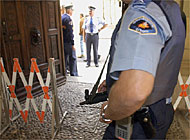Zug mediator puts emphasis on prevention

A trial experiment in public mediation gets underway in Zug next week, in direct response to the local parliament massacre of September 2001.
From Monday, a public mediator will be available to citizens who believe they have been wronged by the authorities.
It’s hoped that earlier dialogue with aggrieved locals can help prevent such escalations of anger as that which erupted so tragically 16 months ago, when 57-year-old Friedrich Leibacher stormed the cantonal parliament, killing 14 politicians before turning a gun on himself.
Three-year row
It later emerged that Leibacher had been involved in three-year row with national and local authorities, all of which had begun with a row between Leibacher and a Zug bus-driver.
Given all the attention that came Zug’s way in the days, weeks and months after the parliamentary shootings, one might expect the canton’s first public mediator to be feeling a fair bit of pressure as he prepares for his first day in office.
But the man in question, Zurich lawyer Beat Gsell, seems relaxed and assured as he speaks to swissinfo about the challenge ahead. He’s also keen to stress that his new job will not be all about preventing further massacres.
One-off incident
“I think what happened in Zug was and remains, thankfully, a one-off incident,” Gsell says. “So we shouldn’t imagine that I will regularly have to deal with such extremely troubled people.
“The idea behind the job is to get involved in potential problem cases much, much earlier to try to stop bigger conflicts from developing.”
Gsell is set to begin his work on a part-time basis, dividing his time equally between his duties in Zug and his ongoing legal practice in Zurich.
If the Zug trial is successful, however, it’s expected that the position of public mediator will be expanded into that of an ombudsman working up to four days a week.
Although ombudsmen have become commonplace in many other countries, they are still relatively untried in Switzerland.
Only three cantons (Zurich, Basel City and Basel Land) and three city authorities (Zurich, Winterthur and Bern) currently employ an ombudsman. A similar trial to the Zug project is currently underway in canton Vaud.
Good listener
“You have to be able to listen well, and treat both parties as impartially as possible,” says Gsell when asked about the qualities that make a good mediator.
“You also have to be able to ask precise questions, to help clear up any confusion. And of course it’s very important that you are independent from the authorities.”
Being independent from the local government and justice system means that Gsell will not himself be in a position to hand out verdicts or order compensations to be made.
He can, however, make recommendations to the authorities that they reconsider their response to individual cases.
“The recommendation is not binding of course,” Gsell concedes, “but there is a certain obligation on the authorities to listen, because it comes from the official mediator.
“In most cases, though, I won’t need to make such recommendations because the plan is to reach actual solutions as often as possible, by sitting both sides down together or by shuttling between them and coming up with an agreement that satisfies both parties.”
Other measures
Gsell is keen to stress that his new position is not the only measure taken by the Zug authorities in their efforts to ensure that the events of September 2001 remain “a one-off”.
Security systems and procedures are being tightened up at public administration buildings, while staff have also received increased training in conflict situations.
In the highly unlikely event that he has to deal with “another Leibacher”, Gsell knows he can rely on the support of a community which is now much more aware of the need to take early action.
“Having a mediator here in Zug should help us to recognise what’s happening if we do ever have to deal with such an extreme type of person again – the sort of person who really represents a danger to society, or is making serious threats.
“In the shadow of the terrible events that happened here, nobody is likely to ignore such threats and I certainly won’t shy away from them.
“Some cases clearly are beyond simple, friendly mediation and I will be ready to call on support, be it from the police or from psychologists, if threats are being made that I consider serious.”
Measuring success
It will always be difficult to evaluate the success rate of independent mediators or ombudsmen – to take the most extreme cases, one can of course never know if mediation has ever prevented a massacre from taking place.
But after looking at the work of other mediators around Switzerland, Gsell is confident that it is possible to draw some conclusions about the worth of such appointments.
“You can look at the annual reports put out by the mediators and clearly see in how many cases solutions have been found to the various problems, usually at a very early stage.
“It’s certainly true that we can’t guess what could have happened if we hadn’t intervened. But I think it’s a good thing, that we don’t have to imagine those sort of scenarios.”
swissinfo, Mark Ledsom in Zurich
The Zug authorities decided to appoint a public mediator as part of the measures taken after the parliamentary massacre, in which 14 local politicians were shot dead.
Zurich lawyer Beat Gsell will serve as mediator on a part-time basis during the scheme’s trial period.
The mediator cannot make binding decisions but can put recommendations to the local authorities.

In compliance with the JTI standards
More: SWI swissinfo.ch certified by the Journalism Trust Initiative











You can find an overview of ongoing debates with our journalists here . Please join us!
If you want to start a conversation about a topic raised in this article or want to report factual errors, email us at english@swissinfo.ch.